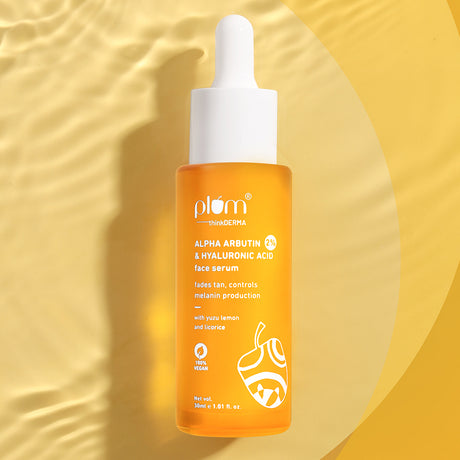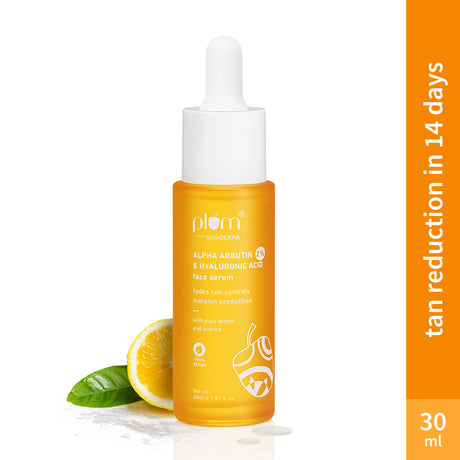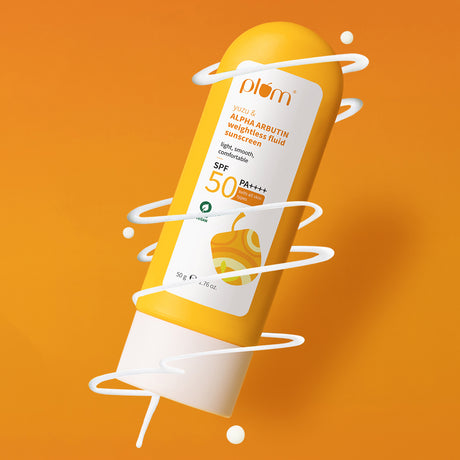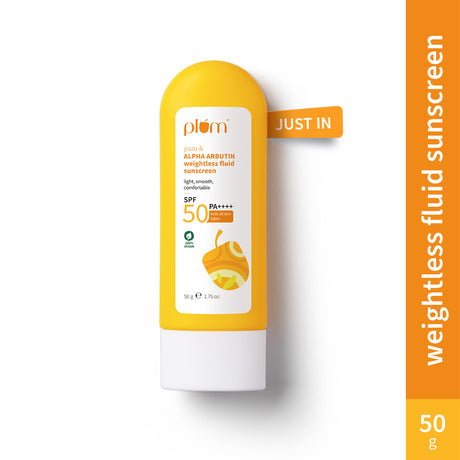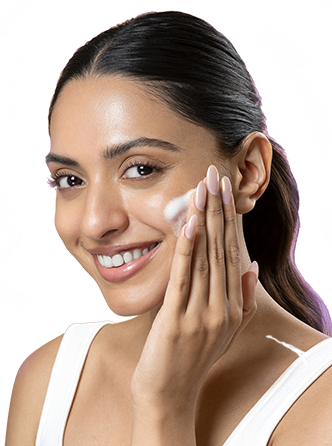
IN THIS ARTICLE
What does alpha arbutin do to the skin? Uses of alpha arbutin!
How to use alpha arbutin?
Kojic acid uses vs alpha arbutin uses: A comparison
How is alpha arbutin better than kojic acid?
Which one should you choose?
FAQs
Considering how science-backed solutions are taking over beauty formulations, it's no surprise that you often hear buzzworthy ingredients targeted toward your different skin concerns.
However, the more number of options, the higher the confusion.
So how do you decide which one is for you?
For instance, both alpha arbutin and kojic acid help fade dark spots, hyperpigmentation, and uneven skin tone.
But which one should you choose? Which active ingredient is more suitable for your skin concern?
Let’s find out.
In this blog, learn about the benefits & uses of kojic acid and alpha arbutin, what they do, and which is better of the two for you. Read on.
What is kojic acid?
Kojic acid is a naturally occurring compound produced from various types of fungi, fermented rice, soy sauce, and sake production.
Kojic acid penetrates the skin and inhibits the tyrosinase enzyme production, which plays a key role in melanin production.
By regulating and slowing melanin synthesis, it effectively reduces the appearance of dark patches, discoloration, spots, tanning, and uneven skin tone and prevents them from reappearing.
What are the benefits of kojic acid for the skin?
1. Brightens Skin:
Kojic acid is known to lighten skin by reducing dark spots, hyperpigmentation, and post-inflammatory marks. It also helps reduce blemishes caused by sun damage, acne, or melasma.
2. Reduces Tan:
It also fades sun-induced tanning over time, leaving your skin even-toned.
Use of kojic acid: The best way!
- Kojic acid is typically used in lower concentrations of 1%–2%.
- It is best to use a kojic acid serum for more effective results. Additionally, you can also use creams, soaps, and face washes infused with kojic acid.
- If using a serum, dispense a few drops of kojic acid serum on your skin and pat it in.
- If using a cream, apply it directly on the affected areas, and follow up with a moisturizer.
- Always follow up with sunscreen during the day, as kojic acid can make the skin more sensitive to UV rays.
Are there any side effects of using kojic acid?
- Avoid using concentrated kojic acid on your skin daily if you have hypersensitive or reactive skin.
- It can make your skin more sensitive to sun damage. Therefore, always follow up with sunscreen during the day.
- It can also dry or irritate your skin if you have allergies or sensitivity. Always perform a patch test before incorporating kojic acid into your routine.
What is alpha arbutin?
Alpha arbutin is a plant-derived compound extracted from bearberry, cranberry, or mulberry leaves. Like kojic acid, it is a tyrosinase inhibitor that fades sun tan and brightens the skin.
It gradually releases hydroquinone which makes it gentle on the skin and less likely to irritate or cause any sensitivity.
What does alpha arbutin do to the skin? Uses of alpha arbutin!
1. Lighten and brighten the skin:
Alpha arbutin helps fade dark spots, acne scars, blemishes, and melasma without irritating.
2. Evens skin tone:
Consistent use of alpha arbutin reduces dark spots on your skin and promotes a uniform complexion and skin tone.
3. Safe and gentle
Unlike kojic acid which can irritate your skin, alpha arbutin is gentle and safe to be used on all skin types.
How to use alpha arbutin?
- It is best to use alpha-arbutin in a lower concentration of 2% or less in serums and creams. You can try the 2% Alpha Arbutin & Hyaluronic Acid Face Serum
- You can use it daily in the form of serums or face wash twice.
- Follow up with a nourishing moisturizer and a sunscreen to protect your skin from further pigmentation.
Kojic acid uses vs alpha arbutin uses: A comparison
|
Basis |
Kojic Acid |
Alpha Arbutin |
|
Skin brightening |
Effective for reducing pigmentation and tan. Works faster but may irritate sensitive skin. |
Gradual brightening with fewer side effects. Gentle on all skin types. |
|
Sensitivity |
Can cause mild irritation, especially for sensitive skin. |
Well-tolerated even by sensitive or reactive skin. |
|
Effectiveness on melasma |
Effective, but requires consistent use and high SPF. |
Equally effective but safer for prolonged use. |
|
Pairing with other actives |
Avoid pairing with exfoliants to prevent irritation. |
Works well with niacinamide, hyaluronic acid, and vitamin C. |
|
Best suited for |
Treating stubborn pigmentation and post-inflammatory marks. |
Gentle treatment for dark spots, uneven tone, and sensitive skin. |
How is alpha arbutin better than kojic acid?
While kojic acid is more popular for hyperpigmentation and melasma, alpha arbutin is a better option due to the following reasons: :
- It is gentle on the skin: Unlike kojic acid, which can cause stinging, irritation, or redness, alpha arbutin is much milder, making it suitable for all skin types.
- It is compatible with most actives: Alpha arbutin pairs comfortably with other actives, amplifying its effects without increasing the risk of irritation.
- It gives gradual yet long-term results: Although it gives slow results, it delivers consistent and lasting results over time.
Which one should you choose?
To choose the one for you, it is crucial to consider your skin type and concerns. If you have stubborn hyperpigmentation, melasma, or post-inflammatory marks, you can opt for kojic acid. But ensure it suits your skin by patch testing first.
However, if you need to reduce tanning, fade off blemishes, and lighten spots while protecting your skin from any irritation or allergies, alpha arbutin would be best for you.
Moreover, if your skin tends to flare easily or reacts to stronger actives, it is suggested to stick to alpha arbutin.
FAQs
Q1. Which is stronger- kojic acid or alpha arbutin?
Kojic acid is known to be stronger and can irritate the skin as well. However, while alpha-arbutin works slowly on your skin, it is gentler.
Q2. What does kojic acid do for your skin?
Kojic acid brightens the skin by reducing pigmentation and inhibiting melanin production.
Q3. Can I use kojic acid on my skin every day?
Daily use is not recommended, especially for sensitive skin, as it may irritate. Use it 2–3 times a week.
Q4. Can I leave kojic acid overnight?
It’s best to follow the instructions on the product label. If it’s in a serum or moisturizer, you can leave it on overnight, but always patch test first.
Q5. Can you use alpha arbutin daily?
Yes, alpha arbutin is safe to use even for sensitive skin and can be used on your skin daily.



